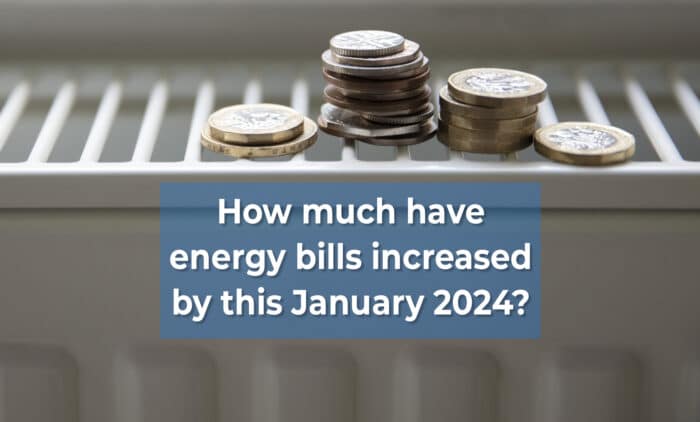
In February 2022, Russia’s invasion of Ukraine caused turmoil in the energy sector resulting in household energy prices soaring.
Whilst in recent years the cost of variable tariff energy deals in England, Wales and Scotland has been controlled by the Ofgem energy price cap, the effects of the Russian invasion put so much pressure on typical households that in October 2022 the government had to bring in new temporary measures that would guarantee a typical household’s annual gas and electricity bill stayed below £2500.
After 8 months, in June 2023, the Energy Price Guarantee came to an end. We are now in our first January since the energy crisis without the protection of Energy Price Guarantee, so just how much are our bills going to increase under the higher level of the Ofgem cap?
What is a typical household bill this January?
From January, the typical household bill has increased by 5% or £94 from £1,834 to £1,928. Standing charges – the fixed daily rate covering the costs of connecting to a supply remain unchanged at 53p a day for electricity and 30p a day for gas.
What is a typical household?
Whilst it is true that most households are not typical and bills are in fact based on how much energy you actually use (in kilowatt hours), the typical household calculations give us a good guide.
The calculations for a typical household are based on a direct debit dual fuel customer using 11,500 kWh (kilowatt hours) of gas and 2,700 kWh of electricity a year.
Should I fix my energy prices now?
To average payments out across the colder and warmer months of the year, most people tend to pay for their energy by direct debit, however with analysts expecting energy prices to fall back when the energy cap is next reviewed in March, some bill payers may wish to consider taking advantage of some of the fixed tariff deals currently on the market.
As always when making this kind of decision, it is a case of what works best for you. Whether that is paying the lowest energy price right now, or having the security of a fixed deal. Either way it is strongly advised that you weigh up all the information available, seek independent advice from trusted sources and consider the pros and cons for all options before making the decision.
What if I’m on a prepayment meter?
From January, a prepayment meter household saw their typical annual energy bill rise from £1,949 to £1,960. Whilst only an £11 increase, this is still £32 more than direct debit customers will pay.
Those who pay every three months by cash and cheque also pay more than those who use other methods of payment. Their typical annual bill in January is £2,058, £130 more a year than if they paid by direct debit.
The government has promised to bring prepayment energy charges in line with those for direct debit customers.
Is there any extra support available to help pay energy bills?
Whilst there is no £400 discount for all households this year, as last year, there is still support for the groups that need it most. Some will receive help through cost-of-living payments, whilst vulnerable families can also claim help through the Household Support Fund and the Warm Home Discount scheme.
Additionally:
- Households on means-tested benefits will receive £900 – paid in three instalments in spring 2023, autumn 2023 and spring 2024
- Pensioner households will receive £300
- People on certain disability benefits will receive £150
More ways to save money on your energy bills
If you enjoyed this article and would be interested in other tips to save on your energy bills, please read one of the articles below:
- Energy Saving Tips for Autumn/Winter
- How you can save on your energy bills
- How to choose energy efficient appliances
- Who is entitled to Free Home Insulation?
You can also read lots more energy saving tips on our Energy Savings Tips blog page.